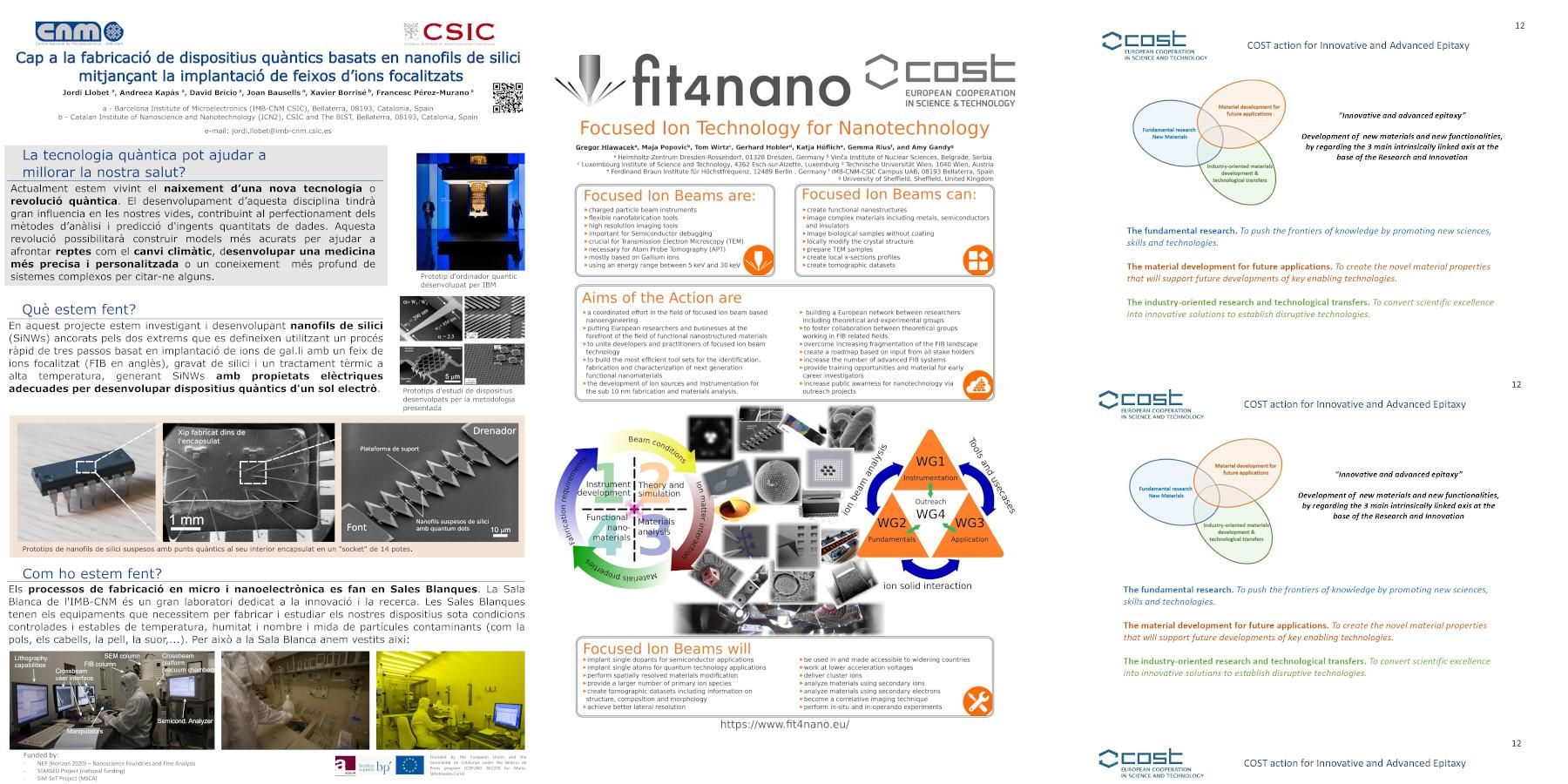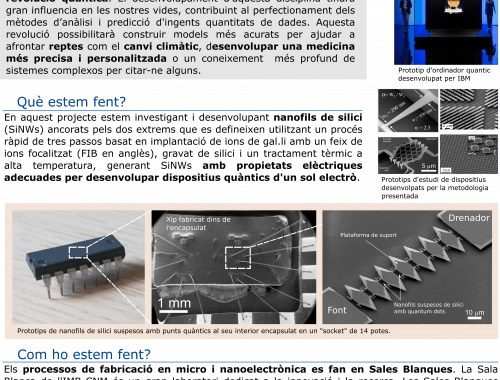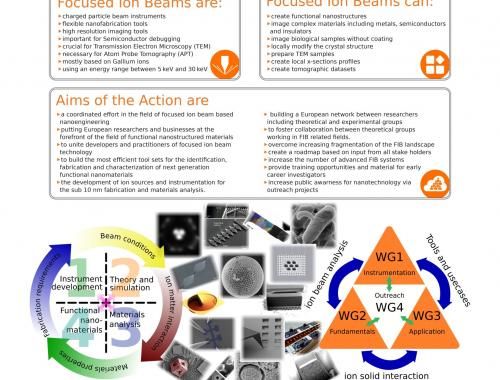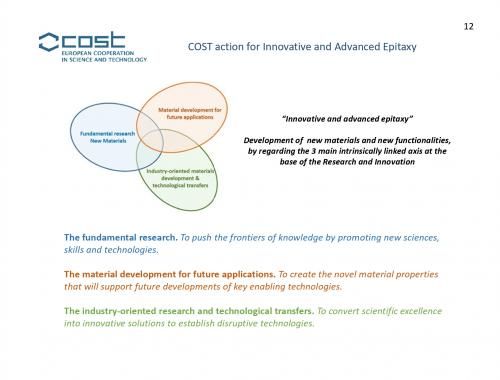European projects underway to celebrate the European Researchers’ Night
The European Researchers’ Night (Nit Europea de la Recerca) is a public event dedicated to the dissemination of science throughout Europe. It celebrates European projects and collaboration among its main players. This is a list of some European projects that started this year at IMB-CNM in the areas of nanoscience, energy and engineering.

European Researchers' Night aims to bring research, innovation and researchers to the public of all ages. It is an opportunity for dissemination in a smooth way and a time to revisit European collaboration in institutions. Here you can find some of the current European projects IMB-CNM is involved.
European Network for Innovative and Advanced Epitaxy
The world is now facing challenges affecting our daily-life that include, among the most acute, health care, energy, telecommunications, sustainable industry, smart cities and climate action. The successful response to these challenges lies on our ability to solve technological roadblocks related to the development of advanced devices. Material science is at the heart of technological developments. Especially, epitaxy has always been the most powerful technique to fabricate/manufacture materials while controlling their properties at nanoscale, enabling the development of advanced devices.
Today, material development becomes more vital than ever. To break down the barriers limiting the development of more efficient devices, continuous innovation is essential. To build the foundation of new epitaxial and material science solutions, a European-level structure in epitaxy is today crucial to enhance knowledge sharing at wide scale thanks to cross-community discussions and exchanges.
The COST Action “European Network for Innovative and Advanced Epitaxy”, named OPERA, will build a new and innovative European Network composed of expert communities in epitaxial growth focusing on different materials classes: conventional semiconductors, oxides and 2D materials. It aims to bridge the gap between traditionally separated scientific communities, both academic and industrial, having the common goal to combine complementary knowledge, push further the material maturation, and exploit epitaxial combinations of the different material classes in order to unveil new properties and produce new functionalities. Based on this organization, the OPERA COST Action will foster interdisciplinary collaborative research activities allowing maintaining European epitaxy at the topmost worldwide level of research and innovation.
Joan Marc Rafí is the IMB-CNM PI involved in the project.
SiM-SeT (Single Molecule – Sensing Technology)
In this project, we are investigating doubly-clamped SiNWs that have been defined using a rapid three-step mask-less process based on focused ion beam (FIB) gallium implantation, silicon etching and a high temperature annealing step, generating SiNWs with optimal electrical properties for device development.
By controlling or tuning the annealing step, it is possible to promote recrystallization and the formation of nanocrystals or quantum dots (<10 nm) embedded inside the nanowires. This opens the possibility to fabricate Single Electron or Hole Transistors useful for quantum computing and with potential applicability in bio-sensing. Single electron devices can be formed by a small conductive island (of dimensions or diameters equals or smaller than 10 nm) electrically insulated from source and drain electrodes by two small capacitances. As a result, discrete electron energy levels can be created. In SETs, few electrons (ideally a single electron) are enough to define a bit of information. This gives unprecedented sensitivity to low charge perturbations, what can be exploited for single molecule detection and for quantum computing.
Researcher Jordi Llobet is the lead PI.
iRel 40: Intelligent Reliability 4.0
Intelligent Reliability 4.0 (iRel40) is an international project to enhance the ECS reliability, a “must have” to fulfil customer demands and the needs of an increasingly more complex environment, as the world transitions to complex systems with more electronics and autonomy in various application domains. It is happening with the new smart transport and mobility, the digital industries, the industrial production or the energy sector. In this framework and during 3 years, iRel40 connects 75 institutions from 13 European countries, including the Institute of Microelectronics of Barcelona through the Power Devices and Systems Group.
Xavier Perpiñà is the lead investigador of the IMB-CNM’s contribution.
EXFILES: Extract Forensic Information for LEAs from Encrypted SmartPhones
The EXFILES project aims to provide Law Enforcement Agencies (LEAs) with new tools to extract data and associated evidence from these devices in strict legal contexts. A unique consortium of five LEAs, universities and cyber security companies from the EU have joined forces to address these challenges. Together, they defined three areas of work on technical data extraction techniques, namely software exploitation, hardware methods and combined methods. In addition, tools and methods inspired by other areas of information security (e.g. security assessments based on common criteria) will lead to new judicial methods of accessing data for lawful investigations. The main objective of EXFILES project is to improve LEAs techniques and methods, to extract digital evidence from modern encrypted smartphones used by criminals based on holistic approach (both software and hardware).
Salvador Hidalgo is the main researcher involved in the project, whereas Jofre Pallarès was in charge of presenting it in one of the IMB-CNM Talks last June.
FIT4NANO: Focused Ion Technology for Nanomaterials
We are a growing group of researchers focused on the development and application of Focused Ion Beam (FIB) Technology for the fabrication and characterization of functional nanomaterials. A focused Ion beam provides the unique possibilities to create new functionality in materials on the nanometer scale as well as to characterize such materials on the relevant length scale of a few nanometers. This can be applied to a wide number of materials covering many research fields such as the semiconductor industry, health, raw materials, quantum materials, 2D materials and optically active materials and devices, etc.
To achieve this goal we work together across Europe with partners from academia and industry to further strengthen the position of Europe at the forefront of spatially resolved functional nanomaterial fabrication and characterisation using focused ion beams.
Researcher Gemma Rius is the PI of the IMB-CNM’s contribution to the project.
EPISTORE: Thin Film Reversible Solid Oxide Cells for Ultracompact Electrical Energy Storage
"Thin Film Reversible Solid Oxide Cells for Ultracompact Electrical Energy Storage" aims to revolutionise the energy storage sector through the development of state-of-the-art thin film technology. The goal is to develop Solid Oxide Cells able to store renewable electricity for applications where the use of batteries is inefficient. It tackles the viability of new technologies, which tend to be expensive, and the paradigm of creating large-scale storage.
IMB-CNM director and MESSI researcher Luis Fonseca is the lead PI of the IMB-CNM’s contribution to the project. He also did a presentation of the project in one of the IMB-CNM Talks.
GREAT4PA: Self-powered and fully biodegradable electronic system for measuring local parameters and releasing agrochemicals in agricultural fields
The project will receive budget for enhancing precision agriculture (PA) and help produce more food, despite the shrinking of agricultural zones. The grant is a concession of the Horizon 2020 program, within the European Commission. The developed devices will tackle the issues that conventional nodes face nowadays, such as the replacement or recharge of the batteries, which cannot be left in the soil due to its toxic metals. It aims to redefine the electronic components involved in this processes in order to obtain self-powered biodegradable nodes, having the ability to physically disappear after a period of operation, with zero environmental impact.
MSCA fellow Denis Desmaele is one of the researchers in the project and he made a quick introduction to its objectives in one IMB-CNM Talks last May.
Dissemination activities for the European Researchers' Night
The European Researcher's Night is a public event dedicated to the dissemination of science. Its aim is to bring research, innovation and its lead actors to the public of all ages in a smooth and fun way.
This event is held every year in more than 300 cities in 30 European countries at the same time. In the previous edition, more than 200 activities were carried out in Catalonia, including talks, workshops, experiments, shows and games.
The IMB-CNM is involved in a couple of dissemination and outreach activities, as well as the CSIC centers in Catalonia.







